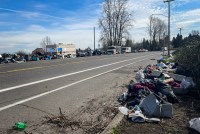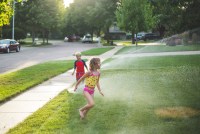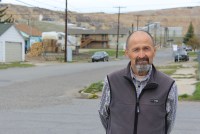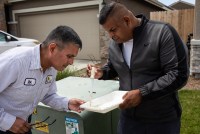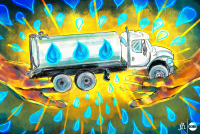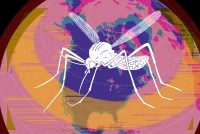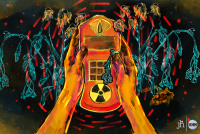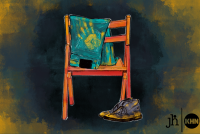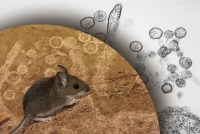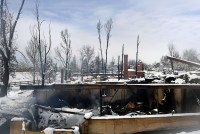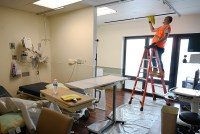Latest KFF Health News Stories
Colorado’s Efforts Are Not Enough to Solve Its Ozone Problem
Some health experts said measures underway by state and federal officials won’t lower ozone pollution to safe levels across nine counties of Colorado’s Front Range.
El calor extremo puede causar calambres, agotamiento por calor e insolación. El calor extremo contribuyó a la muerte de unas 12,000 personas en Estados Unidos cada año entre 2010 y 2020, según un estudio de la Universidad de Washington. Es probable que esas cifras aumenten.
LA’s First Heat Officer Says Helping Vulnerable Communities Is Key to Achieving Climate Goals
Los Angeles taps Marta Segura, director of the city’s climate emergency mobilization office, as its first heat officer. Segura, the first Hispanic person to hold such a position in the country, will work across city departments on an early warning system while developing cooling strategies.
Sobering Lessons in Untying the Knot of a Homeless Crisis
The homeless tragedy in Portland, Oregon, now spills well beyond the downtown core, creating a crisis of conscience for a fiercely liberal city that has generously invested in homeless support services.
It’s Hot Outside — And That’s Bad News for Children’s Health
An article in the New England Journal of Medicine takes a sweeping look at how heat — which can be a byproduct of air pollution and climate change — adversely affects people’s health, especially that of kids.
Covid Funding Pries Open a Door to Improving Air Quality in Schools
Researchers say the billions in pandemic funding available for ventilation upgrades in U.S. schools provides a once-in-a-generation opportunity to combat covid-19, as well as making air more breathable for students living with allergies, asthma, and chronic wildfire smoke.
Some People in This Montana Mining Town Worry About the Dust Next Door
Residents of a Butte neighborhood are concerned about the dust from a nearby open-pit mine that can coat their homes and vehicles. In a city where past mining left a legacy of soil and water pollution, is the air unsafe, too?
KHN’s ‘What the Health?’: Washington’s Slow Churn
Stemming gun violence is back on the legislative agenda following three mass shootings in less than a month, but it’s hard to predict success when so many previous efforts have failed. Meanwhile, lawmakers must soon decide if they will extend current premium subsidies for those buying health insurance under the Affordable Care Act, and the Biden administration acts, belatedly, on Medicare premiums. Margot Sanger-Katz of the New York Times, Sandhya Raman of CQ Roll Call, and Rachel Cohrs of Stat News join KHN’s Julie Rovner to discuss these issues and more. Also this week, Rovner interviews KHN’s Michelle Andrews, who reported and wrote the latest KHN-NPR “Bill of the Month” episode about a too-common problem: denial of no-cost preventive care for a colonoscopy under the Affordable Care Act.
Una generación de insectos de laboratorio podría ser una herramienta eficaz para eliminar al mosquito que causa enfermedades que pueden resultar mortales.
Rural California Hatches Plan for Engineered Mosquitoes to Battle Stealthy Predator
Tulare County officials hope the region will soon be a testing ground for a new generation of technology in a centuries-old war: Human vs. Mosquito.
‘American Diagnosis’: ‘Water Warriors’ Tap Diné Resilience to Increase Access on Navajo Land
Over decades, federal and state policies have left many tribal communities without access to clean, running water. This episode explores what separates some Diné and other Native people in the western United States from this critical resource.
Las sequías, las lluvias y el clima extremadamente cálido han creado la tormenta perfecta para que haya más mosquitos y más enfermedad.
Climate Change May Push the US Toward the ‘Goldilocks Zone’ for West Nile Virus
Colorado recently recorded the most West Nile virus deaths and cases of neuroinvasive infections in nearly two decades. Scientists warn that climate change will make conditions ripe for more West Nile transmission.
Journalists Recap Coverage of the Ongoing Pandemic and Lead Risks in Schools’ Drinking Water
KHN and California Healthline staff made the rounds on national and local media this week to discuss their stories. Here’s a collection of their appearances.
This episode is the second half of a two-part series about uranium mining on the Navajo Nation. A coalition of Indigenous leaders and non-Native locals are lobbying Congress and fielding research to force the cleanup of abandoned uranium mining sites and expand federal compensation for workers harmed by the uranium industry.
‘American Diagnosis’ Episode 3: Uranium Mining Left Navajo Land and People in Need of Healing
Episode 3 is an exploration of the forces that brought uranium mining to the Navajo Nation, the harmful consequences, and the fight for compensation that continues today.
Montana Mice May Hold the Secret to Virus Spillover
Researchers in Montana are working to figure out how climate change and biodiversity affect viruses’ jump from animals to people.
Colorado abre período especial para tener seguro de salud por omicron y un incendio forestal
Funcionarios estatales anunciaron la apertura de un período especial de inscripción hasta el 16 de marzo, abierto para todos los residentes de Colorado sin seguro, independientemente de si fueron afectados por el fuego o por covid-19.
Wildfires and Omicron Prompt a Special Health Insurance Enrollment Period in Colorado
Disasters have previously prompted special enrollment periods in California, Maine, and the South. Now, Colorado is extending the state insurance marketplace sign-up period by two months.
Fire Closes Hospital and Displaces Staff as Colorado Battles Omicron
The most destructive fire in state history has knocked a hospital out of service and left health care workers homeless with omicron driving new covid hospitalizations.





